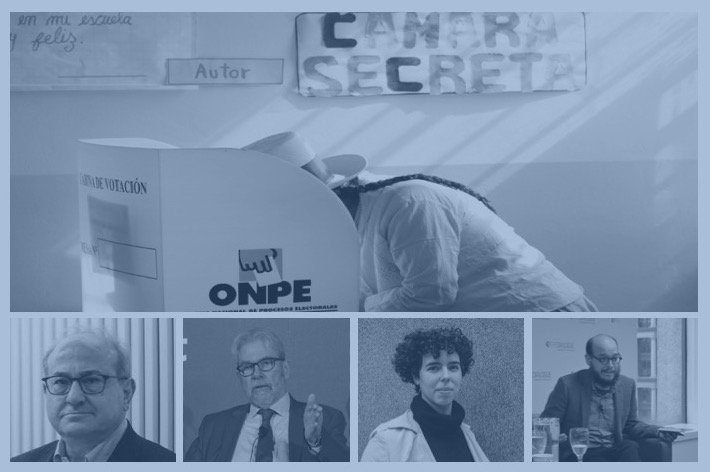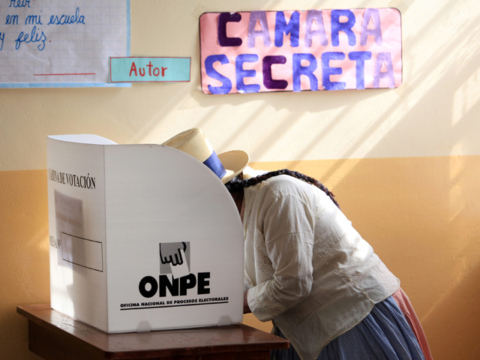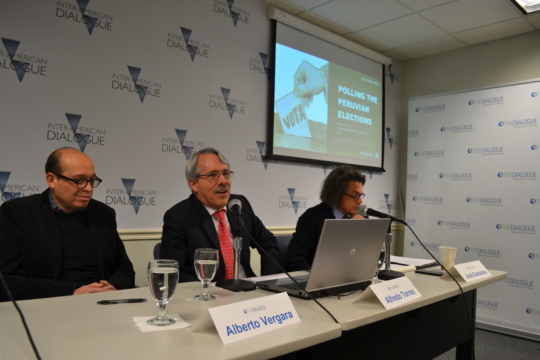Peru’s Election and Beyond: What’s Next?
Peruvians want an evolution, not a revolution.
On June 1, the Inter-American Dialogue welcomed panelists Michael Reid, Adriana Urrutia Pozzi-Escot, and Alberto Vergara for an online event, “Outlook for Peru’s Troubled Democracy,” to discuss the contested presidential runoff in Peru. Michael Shifter, president of the Inter-American Dialogue, gave opening remarks and moderated the discussion. As the two candidates, Pedro Castillo and Keiko Fujimori, battle for the presidency, this conversation delved into the deepening political polarization in Peru as well as the ongoing crisis of legitimacy for both candidates. Panelists also explored the election within the context of mounting economic inequality and popular discontent in the wake of Covid-19.
Michael Reid, senior editor and “Bello” columnist for The Economist, contextualized the election in economic and political terms, explaining Peru’s paradox of relative economic success alongside precarious politics. However, Reid stated, “The pandemic exposed inequalities, incompetence and frailties in Peru.” Describing this period as a process of political destruction and conflict, Reid anticipated that current political conditions may undermine the foundation of Peru’s economic vitality. In regards to Castillo and Fujimori, Reid outlined the risks that each candidate poses to the Peruvian democracy. First, although Castillo represents a cry for social justice and structural change in Peru, considerable doubts remain as to his ability to lead the nation and withstand the economic and political crisis at hand. While his inexperience generates concern, Fujimori’s political career serves as a detriment to both her campaign and democratic governance in Peru. Reid stated that Fujimori is a damaged political figure that has proven destructive during her time in Congress. Despite her ability to form a more coherent government, Reid cautioned that she would not remain a democratic leader if in power, opening the door for unmanageable political conflict to arise like in the case of Colombia.
Alberto Vergara, professor at the Universidad del Pacífico, reinforced the points made by Reid and shared concerns about the candidates’ irresponsible economic promises and totalitarian tendencies. In the midst of an economic, sanitary, and political crisis, Vergara emphasized the danger of political polarization. He stated, “By refusing to adopt a more democratic stand, [Castillo and Fujimori] have transformed this runoff into a competition in which citizens are invited to decide: who do you fear more, communism or fujimorismo?” In light of the episodes of violence during the presidential campaign, Vergara anticipated an aggressive response from the losing party as well as possible widespread violence. This politics of fear is another source of concern for Vergara, as he explained the intensifying fear from the business community about a potential Castillo government. He also noted that if elected, Fujimori may lead with authoritarian rule due to enduring fears of communism and Castillo’s supporters.
This event also examined the unprecedented discontent of Peruvians in the wake of Covid-19. This political mood is directly tied to increasing economic inequality as Adriana Urrutia Pozzi-Escot, president of the social organization Asociación Civil Transparencia, highlighted in her remarks. Urrutia provided electoral maps to illustrate the territorial dynamics at play in the election, emphasizing the role of rising poverty in driving election results. Furthermore, Urrutia shared the work of her organization in ensuring that both candidates agree to lead the country while preserving democratic governance if elected. This agreement is crucial considering the risk of electoral fraud as well as mounting tension between Congress and Parliament. Urrutia also noted that political gestures from the two candidates will not sway voters. She stated that many have already decided their vote and will opt for a more authoritarian, military-led candidate in the face of a crisis. Thus, concerns regarding conserving democratic governance in Peru cannot be understated.
Lastly, panelists responded to questions from audience members in regards to political trends in Latin America as well as the political effects of the pandemic on the election. Reid described the radicalization of Peruvian politics as a byproduct of popular discontent with the status quo and agreed that a Castillo government would generate commentary about a return to the left in Latin America. Vergara also gave remarks regarding the pandemic, cautioning against exaggerations of the pandemic’s impact on Peruvian politics. He reinforced that the political structure of Peru must be considered in addition to the economic inequalities that have shaped the current election.
As Peruvians await the election of their next president, this conversation stressed the election’s implications for democracy and economic growth in Peru. Widespread frustration and opposition to the status quo have revealed the need for decisive leadership to address the multifaceted crises confronting the nation. As Vergara stated, “Peru is a country at the crossroads.” Regardless of the results, the next administration faces unprecedented challenges in a country beset by radicalized politics and the economic and social strains of the pandemic.
Peruvians want an evolution, not a revolution.
Everything you need to know about Peru’s presidential elections.
Insight and analysis into an unpredictable presidential contest
 Main Photo: Globovision / Flickr / CC BY-NC 2.0
Main Photo: Globovision / Flickr / CC BY-NC 2.0

 Video
Video